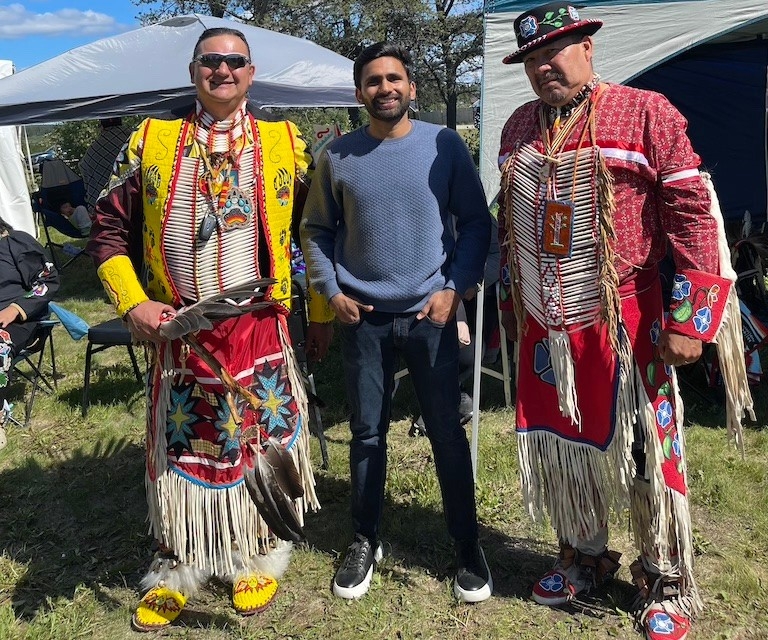Gina Cody co-op students build, learn and connect in the Cree Nation of Chisasibi
 Muhammad Ahsan with Cree Elders at the Pow Wow in Chisasibi
Muhammad Ahsan with Cree Elders at the Pow Wow in Chisasibi
When Muhammad Ahsan first learned about the opportunity to intern in Chisasibi, a remote Cree community in northern Quebec, he was intrigued by the adventure it promised.
"I had never heard of this place before," admits Ahsan, an engineering graduate student from Lahore, Pakistan. “When I Googled it and saw how far it was from Montreal, I thought it would be a good new experience for me.”
Ahsan and fellow student Malik Arsalan are the first two Concordia students to do their co-op internships on Cree territory in one of Canada’s northern regions. And it’s thanks to a unique partnership between the Institute for Co-operative Education and the Cree Nation of Chisasibi.
The community is currently building critical infrastructure projects. These include new roads, housing and a larger hospital that will allow people in the region to get health care locally rather than flying south to Quebec City or Montreal.
"We're delighted that our students can apply their specialized knowledge and skills to development projects in Chisasibi,” says Cherine Zananiri, director of experiential learning and co-operative education at Concordia.
“This partnership can serve as a model for other Cree and northern communities who are facing labour shortages, while increasing the number of internship opportunities for our students."
For Ahsan and Arsalan, who both completed bachelor's degrees in Pakistan before pursuing graduate studies at Concordia’s Gina Cody School of Engineering and Computer Science, the experience has been transformative — both professionally and personally.
The two arrived in Chisasibi in early summer and quickly found themselves immersed in projects crucial to the community’s development. “We are supervising the construction of about 40 houses, and we are also involved in building a fire hall and roads,” Ahsan explains.
For students accustomed to Islamabad or Lahore, and then Montreal, the expansive wilderness and the tight-knit community in Chisasibi offer a big contrast. “Up here, everyone knows each other,” Ahsan says. “The people are very welcoming; they greet you and share their traditions.”
Working in northern Canada does present unique challenges. The construction season is brief, running from June to October, due to the harsh climate.
Arsalan notes, “The weather heavily impacts construction here. Projects that would take months elsewhere can take years because we only get five months to work.”
 Malik Arsalan on site in Chisasibi
Malik Arsalan on site in Chisasibi
‘Deeply moving to witness and learn’
Beyond the technical aspects of construction, the internship also offers a deeper cultural education. Both students have been struck by the Cree community's reverence for the land. They attended a Pow Wow that brought together Cree people from the entire region. “In their culture, the land is their mother,” Ahsan reflects. “They pay tribute to it through these events, and it felt deeply moving to witness and learn from this tradition.”
The students were also invited to an annual large gathering called “Mamoweedow.” The community returns to Fort George Island, where they lived before they were displaced in the 1980s due to a hydroelectric dam project.
“We spent two nights on the island, joining in their celebrations, which connect them with their history and their ancestors. We ate traditional food, the children and Elders played games and the community danced late into the night,” Ahsan adds.
The students have had to navigate cultural and practical challenges, particularly when it comes to food. As Muslims who follow a halal diet, Ahsan and Arsalan faced difficulties finding halal food in a community where game such as geese, beaver, moose and whale are a significant part of the local diet. They brought some halal food from Montreal, and local community members have been generous and offered them fish they caught. They even hope to participate in a hunting trip, where they can prepare their game according to halal practices.
“We would love to experience hunting, something we’ve never done before,” Ahsan notes with excitement.
The students also had the chance to see the northern lights. “We went to a beach, and to our surprise, the entire sky was illuminated.”
For these Concordia students, the internship in Chisasibi has been more than just a step on their career path; it has been an immersive journey to Cree territory and culture.
“It’s a totally different way of life here,” Arsalan says. “But we’ve connected with the people in the community. I never expected to have an experience like this, but I will be able to tell my grandchildren that I worked with the First Nations in Canada.”
Barbara Spencer, the human resources director for the Cree Nation of Chisasibi who hired Arsalan and Ahsan, expressed her enthusiasm about their work.
"We're really thankful that they're here, and it will be hard to let them go. They have been so active in our community, and they have helped us so much.”
But the partnership will continue, and soon newly hired Concordia students will be flying north to do internships in Chisasibi for the fall.
Learn more about Concordia’s Institute for Co-operative Education.




